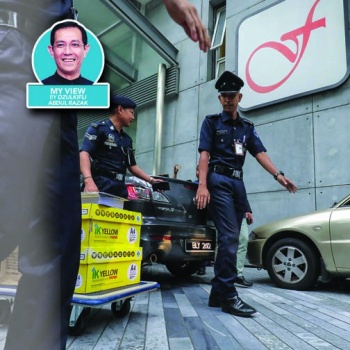The ethics of ‘psycho-profiling’
Professor Tan Sri Dato' Dzulkifli Abdul Razak
My View - The Sun Daily
July 26, 2017

OF late, many things are reported to be dragging Felda and its subsidiaries into a spin.
Following the explosive expose that took FGV by storm recently, other issues are fast coming out of the woodwork with more dire consequences.
One issue is said to be the FIC Hotel purchase in London; a supposedly "old" issue that was revisited backed by "new" evidence thanks to the whistleblower policy.
The FIC management had apparently paid much more than its original price bringing integrity into question.
Indeed, even before this, its board of directors had been removed on grounds of performance.
Notwithstanding such investigations by the ever active MACC, the comment made by the former chief of the Hong Kong Independent Commission Against Corruption in a public discourse last week is disturbing.
He noted a "flat-lining" trend in MACC's performance based on international reports.
Despite some 30 years, since 1987, to fight graft, "the outcome is flat" according to him.
Coupled with the lack of resources and personnel, the effective implementation of its strategies can therefore be compromised.
The MACC's annual budget allocation of RM267 million, which is 0.12% of the government's operating budget allocation (RM223 billion), is a far cry from the 0.5% recommended to fight graft.
He raised the question: "Is it not time for a root and branch reassessment of the way the national anti-corruption strategy has been, and is being, carried out?"
After all he reckoned our fight against corruption "hides an uncomfortable reality" – a view that many would readily agree with.
Similar feelings have been in the air for a long time as more and more issues are being unmasked not only in Felda but also beyond.
In this regard what is puzzling is the move to conduct "psycho-profiling" of Felda settlers.
The reason given is "to enable the government institution to develop new strategies and update its programmes for the group", but the context is not clear.
Has it got to do with the fight against corruption? If so why just the settlers, after all the scheme is older than independent Malaysia and has been subjected to many "new" strategies and programmes.
And why now unless there is a compelling reason to do so since the implications are too huge to imagine.
Apart from the choice of words, psycho-profiling, the invasion of "privacy" of one's mind or psyche is troubling.
This concern needs to be thrashed out.
The information gathered is of utmost concern because it can be abused, especially if it is related to mindset change that borders on conditioning by "posturing" this and that, subtly or otherwise.
This at once raises ethical and moral issues that must be addressed.
Academics who are involved in this venture should be aware of the consequences, even at the pilot level.
Have the participants been fully briefed about the exercise and their written consent obtained so as to protect their privacy?
And have they legally been assured that the information is not passed on or sold to another party without their express approval?
Do they have the right to refuse from being profiled? These are some of the important questions that the public needs to know and endorse.
In a "nanny" community and country, the clarifications are even more crucial because the powers that be have the upper hand.
The people's rights are generally trampled without any consultation resulting in flip-flop decisions.
In a society that shuns public debate and scrutiny even at the hint of being deemed "politically incorrect", profiling of any sort often poses negative connotations because of the trust deficit.
Somehow, the Big Brother image comes to life in the context of ethical violation and that of the rights of individuals without them realising it.
Worst still, as in this case with the implicit objective to turn Felda into "an economic powerhouse" (if it is not so already) this time through their children as claimed.
The involvement of children, directly or otherwise, further heightens the moral-ethical concerns in the search of a so-called "formula" in the drive for "greater success" economically speaking.
Historically, we are reminded as to how children who became subjects of such ambition ended up as terrible human tragedies.
This lays bare the very aspect where the human being is reduced to a mere economic item which explains why Felda and indeed the nation generally are wallowing in corrupt practices with no end in sight.
In this regard, it is vital to come back to what the Hong Kong anti-graft chief said in outlining the seven steps for an effective fight against graft: political will, values set out in law, national strategy, strategy implementation, public support, resources and measuring progress.
The "psycho-profiling" exercise is a poor implementation of strategy.
In the final analysis, regardless of the indication of political will, law and strategy in place, "there are doubts in the implementing policies". And the "psycho-profiling" project is right at the heart of it. Let us make no mistake about this.
